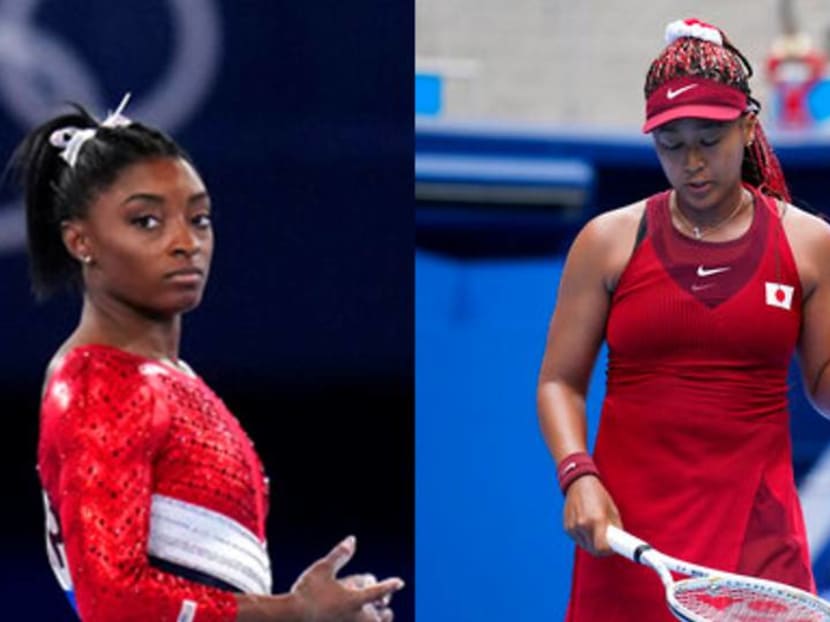Mental health in sport: Self-worth and the weight of expectation
With some high-profile international athletes withdrawing from events because of mental health issues, CNA spoke to local competitors and coaches about the psychological pressures that are encountered in top-level sport.

Gymnast Simone Biles (left) and tennis player Naomi Osaka both withdrew from major competitions, citing mental health issues.
SINGAPORE: There are many rewards that can come with being a top athlete.
The adoration of cheering fans. The ecstasy of bringing glory to club or country. The satisfaction when all the training and preparation pay off.
Until recently, much of the focus on gaining those rewards has been on the physical effort needed.
Increasingly, though, a spotlight is being shone on how climbing the peaks of elite sport can bring with it mental health issues.
American gymnast Simone Biles withdrew from the Tokyo Olympics team competition on Tuesday (Jul 27), citing mental health concerns. She said on Instagram: "I truly do feel like I have the weight of the world on my shoulders at times."
In June, tennis player Naomi Osaka withdrew from the French Open, also citing mental health issues.

Sports coaches and psychologists who CNA spoke to about the mental pressure that athletes face said the expectation to win can be huge, with one describing it as a "big gorilla" on their back.
Sports coach and Nominated Member of Parliament Mark Chay, 39, said the COVID-19 pandemic has created new dynamics that some athletes might have struggled to deal with.
“We’re coming off a year when we don’t have (regular training sessions or competitions). These top athletes are put in a situation where they have no control. The routine, the scheduling, the practice that has led them to success is all crumpled up and thrown into the bin,” he said.
Mr Chay, who coaches Paralympic swimmer Yip Pin Xiu, said coaches and athletes use competitions to track their progress and their competitors’. But this is hard in a pandemic without various competitions leading up to the Olympics.
“Athletes who have experienced success pre-COVID, who have the expectation of winning medals for the nation, they have that big gorilla on their back from the moment they step off the plane,” he said.
EXPECTATIONS, PRESSURE FROM MANY SOURCES
The pressure to succeed can be exacerbated by social media, the coaches observed.
When everyone has access to you, “good or bad, you’re going to get it”, said Mr Chay.
READ: 'It's hard to swallow': Joseph Schooling disappointed by butterfly performance at Olympics, vows to fight harder
“With social media, athletes are very conscious about what they say. Sometimes, they might set expectations for themselves. And of course there are expectations from others. That puts subtle pressure on themselves,” said sports psychologist Edgar Tham, 54.
“It depends on how well they sift it out, and whether they even enjoy that. Some thrive on it, but others just break down. One’s personality, background, hardiness, does play a part.”
Then there is the mental burden of not wanting to let down sponsors, added Mr Chay, who’s also an ex-national swimmer who represented Singapore internationally from 1997 to 2005.
“We have Spex (sports excellence) scholarships, commercial entities backing our athletes. For every year that you take a sport on, it’s an even greater burden or strain because you have to worry about what happens after.”
Mr Chay added that the pressure is exacerbated because sponsors, commercial obligations and other people who are backing the athlete might “drop you if you don’t represent them or their values”.
“And that is your paycheck and your livelihood,” he said.

Not wanting to disappoint their loved ones is also a weight that athletes carry.
“Most of the stress I felt was self-imposed, because I wanted to do well for myself and the country,” shared former track-and-field national athlete Dipna Lim Prasad, 30.
“Even though track is an individual sport, it’s really a team effort. It wasn’t just my immediate coach, support from the Singapore Sport Institute… It’s also your family, or for me, it was my husband, who sacrificed a lot in their personal lives to enable me to pursue this.”
Ms Lim Prasad told CNA she recognised how much effort had gone into just getting her to the starting line.
“It felt like the least I could do was do well, so that I could thank them properly. So that (pressure) was just… a lot,” she added.
READ: Gymnastics: Biles' openness can help end stigma around mental health, says psychologist
For other athletes, like ex-national rower Saiyidah Aisyah, 33, managing personal expectations is a greater beast.
“I was working for months and months trying to let go of expectations. It’s easy for everyone to say, just let go. But it’s not as easy as not thinking about it, because (the expectations) are always going to be there,” she said.
When the country was cheering for her on National Day in 2016 as she competed at the Olympics in Rio de Janeiro, Ms Aisyah remembered a minister talking about her on the news.
“I tried to avoid the news as much as possible, but you know that everyone is watching (you). This skill of letting go of expectations… if you don’t hone it, you’re going to go back to square one. That was one thing I felt I didn’t do well enough,” she said.
“As an athlete, there’s always a lot of expectations you put on yourself. You can always tell yourself, don’t listen to the media, don’t listen to other people. But that voice in your head is the hardest to rid.”

These various expectations put immense pressure on an athlete, shared Mr Tham.
“Expectations cause their brain to enter fight or flight response, which increases tension and blood pressure, and other psychological symptoms that make them less efficient,” he explained.
“When athletes are performing at their best, they’re very efficient. Their muscles tense and relax at the right time. But when you have the expectation in the back of your head, sometimes unconsciously, all these thoughts might lead them to be just a little bit more tense than normal.”
This is why, he added, there’s a “thin line” between good performance and great performance.
ATHLETIC IDENTITY
Beyond expectations, however, athletes that CNA spoke to said “athlete identity” was a strong factor affecting mental health.
“Very often as athletes we tie our self-worth to our sporting performance. That’s something I’ve been burnt by doing before, and I’m in the process of slowly learning to separate it,” shared Ms Yip.
“A couple of years back, I had a dip in performance. I was really, really unhappy at that point in time. Mentally, I wasn’t in a good place, but I tried to do everything I could in my ability to make things better.”

Similarly, Ms Aisyah felt it was hard not to see herself as a rower when she retired from her sport.
“Everyone knows me as a rower, so when I don’t do well in races, I feel that I failed myself as a person. Athletic identity, which is what I’m working on right now (in graduate school), is about ... athletes see that people celebrate them because of their success, so when they don't succeed, they see themselves as a failure as a person,” she said.
“But towards the end of my career, my coach I was working with always reminded me: You're a human first, Aisyah first. Athlete comes in later.”
“The old sports mentality is that you don’t show your weakness. You don’t ask for help,” she added.
“So it’s good that the these two women (Simone Biles and Naomi Osaka) are setting an example by saying, ‘I need help, I need to take a break’, to change the system.”
MANAGING HEAVY EXPECTATIONS
The challenge for athletes in managing expectations is to switch away from the mindset of outcome, results and expectations towards process thinking, said Mr Tham, who has been working with national athletes since 1995.
He explained that process thinking is “thinking about what you normally do in training, focusing on your race plan, your tactics and things that work for you in training”.
Athletes spend “80 to 90 per cent” of time in training, so the key is to replicate what they do in training in the competition, he said.
READ: Cycling: Dumoulin courageous for focusing on mental health, says Wiggins
It is what Ms Aisyah did during the qualifying race for the 2016 Olympics in Rio de Janeiro. Six rowers were competing for one spot, which she eventually won, but she remembered “not thinking about winning that race”.
“All I was focusing on was what I was supposed to do during that time. I didn’t think about the outcome, only the process,” she said.
BUILDING MENTAL RESIILENCE
All action and behaviour starts from the brain, advised Mr Tham, so managing thoughts and emotions would help an athlete perform.
“Sports requires precision, good timing, anticipation, and the ability to stay calm under pressure. When athletes are not able to manage those thoughts and emotions, they will basically wreck their performance,” he said.

Mr Chay, for instance, builds mental resilience by not sheltering Ms Yip from the realities of being a top athlete today.
“I tell Pin Xiu all the time, eh, this is what a world champion does, this is what the expectation is. It’s all in jest but it’s also to motivate her and let her be aware this is the situation,” he said.
“There’s no point sheltering athletes. The best thing to do is make them aware, prepare them mentally. Eventually it’ll be ingrained in their behaviour that they’re not just representing themselves, not just the sport, but also the nation.”
For Ms Aisyah and Ms Yip, they choose to focus on what’s within their control.
“Usually you have thoughts that are out of your control, like how you're not strong enough, you're not fast enough. The things that are within your control right now are your attitude and your effort,” said Ms Aisyah.
“So focus on what you're currently doing, focus on your training, focus on how much effort you're putting into training.”
“The things I can’t control, I’ll just try to let it go. Otherwise, it’s very, very exhausting,” said Ms Yip.
“Pressure is fun, stress is not. How do I manage the stress for it to become good pressure? I haven’t travelled for awhile, so there’s also pressure going to (the Tokyo Paralympics) … but it’s about how to make it work for me.”





